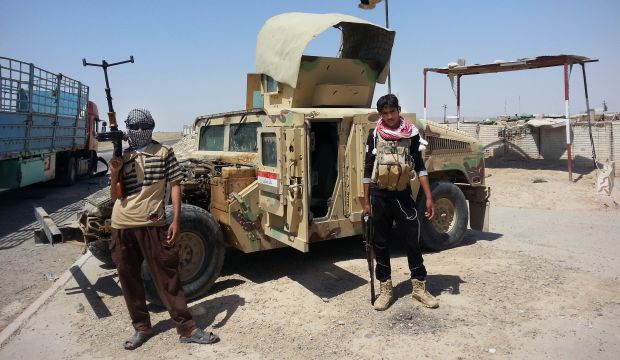
Islamic State of Iraq and Syria (ISIS) militants with a captured Iraqi army Humvee at a checkpoint outside the Beiji refinery, some 155 miles (250 kilometers) north of Baghdad, Iraq, in June, 2014 (AP Photo)
Baghdad, Asharq Al-Awsat—Iraqi Prime Minster Haider Al-Abadi launched a major re-organization of Iraq’s top military leadership on Tuesday, in a step many observers say was aimed at defusing growing public anger over Iraqi military defeats at the hands of radical Islamist militants.
State-owned media reported that Abadi had abolished the Office of Commander-in-Chief, created and occupied by his controversial predecessor Nuri Al-Maliki, and ordered the retirement of Gen. Abboud Qanbar, acting secretary-general of Iraq’s Ministry of Defense, and Gen. Ali Ghaidan, former commander of Iraq’s land forces.
Both commanders were close to Maliki, and along with the former premier have been blamed for the humiliating defeat of the Iraqi army at the hands of the Islamic State of Iraq and Syria (ISIS) in Mosul in June.
The decision is seen as part of a major overhaul of the military establishment and came 24 hours after the new prime minister ordered the arrest of two military officers in command of Saqlawiyah military base in Anbar, which took heavy casualties in an ISIS attack on Sunday.
Troops stationed at the base, located only 30 miles (50 kilometers) west of Baghdad, blamed poor leadership by senior officers for the heavy casualties they took, telling reporters that only 200 of 1,000 men stationed at the base had escaped the attack, and that they had not received adequate supplies of food, water and ammunition.
However, some have played down Abadi’s decisions, arguing that the prime minister’s priority for the time being is to find consensus candidates for the posts of interior and defense ministers.
“The current need to rescue the country is much bigger than just abolishing the Office of Commander-in-chief or pensioning off two senior generals,” security expert Dr. Ahmed Al-Sharifi told Asharq Al-Awsat.
The expert blamed Iraq’s current political elite, including Abadi, for the deteriorating security in the country, warning that unless the prime minister nominates “two professional figures for the ministries of defense and interior, what remains of the country will descend into abyss.”
Sharifi accused Iraq’s political blocs of “restricting the prime minister and lacking the true will for reform.”
Last week Iraqi parliament rejected Abadi’s nominees for the critical posts of interior and defense minister, raising questions about his ability to rally support for an inclusive government, widely seen as a necessary step to stem the growing threat of ISIS.
Popular anger at the army hierarchy and the government remains high. Dozens of family members of Iraqi soldiers killed at the Saqlawiyah military camp demonstrated on Tuesday in front of government headquarters in Diwaniyah province, demanding their sons’ bodies for burial.
Meanwhile, many members of Iraq’s Arab Sunni population are growing increasingly disenchanted with living under the rule of ISIS, a senior tribal sheikh in Fallujah, Wissam Al-Jumaili, told Asharq Al-Awsat.
“Last week Fallujah witnessed fighting that led to the death of around 12 people from both sides after Sunni tribes rejected the expansion of ISIS’s authority within the city and their interference in people’s social life,” the tribal sheikh told Asharq Al-Awsat.
“Sunni tribal rebels represent the majority in the city, nevertheless ISIS seems to be in control,” Jumaili said, maintaining that the rise of foreign jihadists in Fallujah began to provoke “tribal and social tensions.”

Trackbacks/Pingbacks